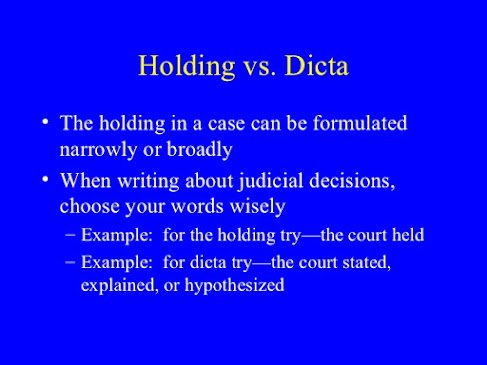Holding or Dicta?
https://nccriminallaw.sog.unc.edu/holding-or-dicta/
Dictum is one of the commonest yet least discussed of legal concepts. Every lawyer thinks he knows what it means, yet few lawyers think much more about it. […] The traditional view is that a dictum is a statement in an opinion not necessary to the decision of the case. This means nothing. The only statement in an appellate opinion strictly necessary to the decision of the case is the order of the court. A quibble like this shows how useless the definition is.
“Judicial dictum” is a statement the court expressly uses to guide parties in their future conduct. As a general rule, such an expression of opinion on a point involved in a case, argued by counsel and deliberately mentioned by the court, although not essential to the disposition of the case, is distinguished from mere obiter dictum, and it becomes authoritative when it is expressly declared by the court as a guide for future conduct. Thus, a judicial dictum should receive dispositive weight in a lower court. Conversely, a court is not bound to follow dicta in a prior case that did not fully debate the point currently at issue.
Thus, our results indicate that the distinction between dictum and holding plays an important role in lower court decision making in fewer than 1 in every 2000 federal district court cases (140 out of 327,524) and in fewer than 1 in every 4000 state court (60 out of 295,452) or federal circuit court (20 out of 80,421) cases. Combining all cases, we estimate that consequential invocations of the holding-dictum distinction occur about once in every 3200 cases (220 out of 703,397). […] For most lawyers, seeing a court disregard a significant statement from a higher court because it is dictum will literally be a once-in-a-lifetime experience.



Comments
Post a Comment